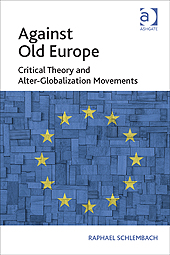New Book on European Identity and Social Movements
 The elections to the European Parliament in May have brought the question of European unity back into the foreground. Right-wing Eurosceptics gained large followings but some advances were also made by progressive parties. I would argue that social movements are the key here. Many left-leaning activist organisations have long denounced the EU as serving the interest of economic elites and following a neoliberal agenda. Along with unions, environmental groups and other civil society organisations they have continuously staged large protests at EU summits in Brussels and across the continent, over issues such as migrant rights, environmental protection and social justice.
The elections to the European Parliament in May have brought the question of European unity back into the foreground. Right-wing Eurosceptics gained large followings but some advances were also made by progressive parties. I would argue that social movements are the key here. Many left-leaning activist organisations have long denounced the EU as serving the interest of economic elites and following a neoliberal agenda. Along with unions, environmental groups and other civil society organisations they have continuously staged large protests at EU summits in Brussels and across the continent, over issues such as migrant rights, environmental protection and social justice.
But does this create a genuine European social movement? Indeed there is well-presented evidence of the rise of a ‘Europeanisation of protest’ (Della Porta and Caiani 2009) whereby social movement actors increasingly form transnational links and direct their advocacy and pressure towards European institutions, sometimes by-passing national political channels. My recent book, Against Old Europe assesses such claims but instead looks at critical theorists and political philosophers associated with neo- and post-Marxist perspectives. They advocate, in the face of a resurgent nationalism, a resistance movement where the agent of change is the ‘European people’ (Balibar), ‘leftist Eurocentrism’ (Žižek) or ‘we, the Europeans’ (Derrida). Antonio Negri for example has publicly spoken in support of a European Constitution and Jürgen Habermas maintains that European-wide protests could spark the development of a genuine and democratic European public sphere, especially when those protests are directed against an American-influenced instrumentalist reason.
Consider, for example, Negri’s position which in his own words should be read as a
… defence of old Europe, defending the idea of a Europe which, in spite of everything, has been the producer of a series of democratic values that are deeper and more real than those offered by the American empire (Negri 2008: 201).
Here, a European identity is explicitly produced ‘from below’ but also against a certain perception of America. For Habermas, anti-war protests against US foreign policy were able to rally the virtues of the European model of soft power approaches to international relations. What he advocates is not so much the agency of a ‘European people’, but the more specific values of an ‘Old Europe’. Consider for example his appeal for a common foreign policy, beginning with the core of Europe:
… we should also remember February 15, 2003, as mass demonstrations in London and Rome, Madrid and Barcelona, Berlin and Paris reacted to this sneak attack. The simultaneity of these overwhelming demonstrations – the largest since the end of the Second World War – may well, in hindsight, go down in history as a sign of the birth of a European public sphere (Habermas and Derrida 2005: 4).
Here Habermas conveniently glances over the large opposition movements that also existed outside of Europe, including in the US.
In the book I point out that this notion of ‘Old Europe’ also finds traction amongst activists and intellectuals associated with extreme nationalism and the far right. They are able to claim the imagined traditions of the European continent to oppose the effects of economic globalisation, which in the far right logic are external impositions. Alain de Benoist, voice of the French far-right anti-globalists, makes this clear:
By definition, hegemony triggers resistance…The ‘Old Europe’ thus stands opposed to the new barbarism.
In my opinion this should be a warning to progressive social movements. The left-populist politics of claiming the agency of a European people clearly comes as a double-edged sword.
The two alternatives put before us tell of a split between a neoliberal ‘Anglo-Saxon’ model of market fundamentalism and the ‘old European’ model of social democracy. But both are two sides of the same, capitalist coin. The first carries on as if the 2008 financial crash had never happened. The second harks back to a quasi-mythical past. The position the book takes is then one of ‘Against Old Europe’ and for an organising agenda beyond Europe.
References
- Della Porta, D. and M. Caiani. 2009. Social Movements and Europeanization. Oxford: Oxford University Press.
- Habermas, J. and J. Derrida. 2005. ‘February 15, or, What Binds Europeans Together’. In D. Levy et al. Old Europe, New Europe, Core Europe. New York: Verso, pp. 3–13.
- Negri, A. 2008. Empire and Beyond. Translated by Ed Emery. Cambridge: Polity Press.
- Schlembach, R. 2014. Against Old Europe: Critical Theory and Alter-Globalization Movements. Aldershot: Ashgate.
 Raphael Schlembach
Raphael Schlembach
Raphael Schlembach is a lecturer in criminology at the University of Brighton. He received his PhD from the University of Manchester in 2010, where he was supervised by Nick Crossley and Nick Thoburn. His primary research interests are in social movement theory, European movements, and the policing of protest.




0 Comments